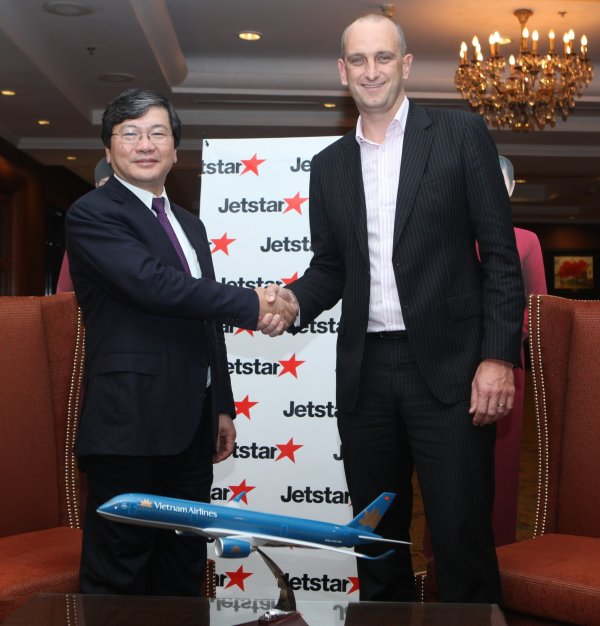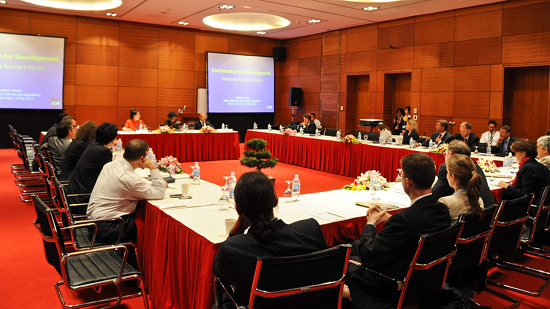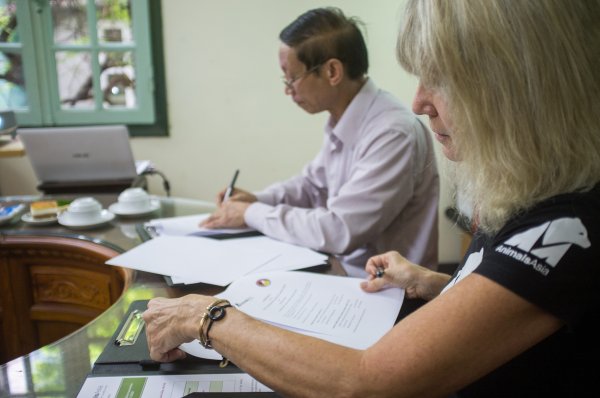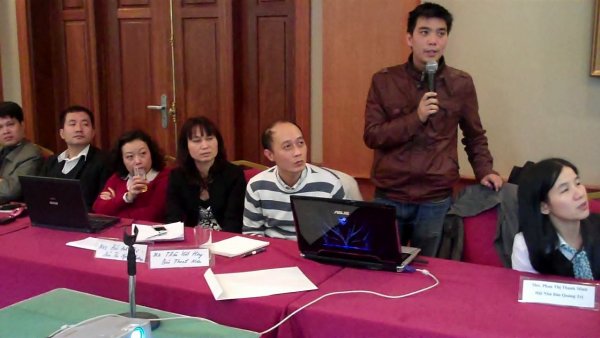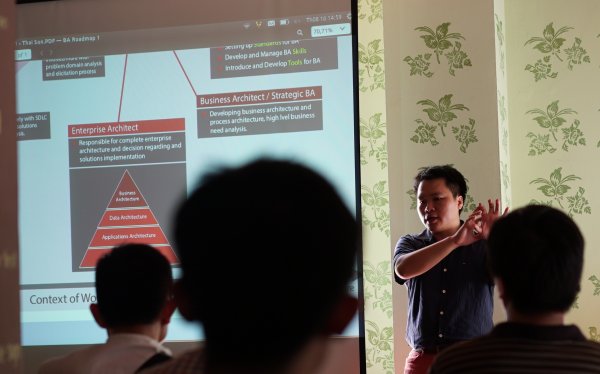Business Meetings
Vietnam’s business ethos is strongly influenced by its culture and history, and it is crucial to learn everything you can about the country before initiating a business deal. Network and meet with people who have experience doing business in Vietnam. Glean information from publications and organizations that are relevant to your enterprise.
Realize that in Vietnam, doing business requires the support of the government and sometimes the military. Although the government opened markets to foreign investors nearly two decades ago, Vietnam is a Communist state, and most of the country’s businesses are owned and regulated by the government.
Types of businesses run the gamut from cottage industries to large corporations, and customs vary depending on whom you are dealing with. The country’s markets are relatively young, and business people are ready to adapt to meet the demands of the world markets. Practices differ depending on the region you are doing business in. Northern Vietnamese tend to be more rigid and traditional, while Southern Vietnamese are usually assertive, lively, and innovative. Southern Vietnamese were quicker to embrace the market economy, and the southern Ho Chi Minh City, the former Saigon, is the country’s business hub.
Preparation
Before planning any business deal in Vietnam, you must consult with and receive approval from the Ministry of Planning and Investment (MPI), which is responsible for planning and regulating programs that require foreign investment. The MPI issues foreign business licenses and, along with local agencies, has the power to advance or deter projects at its discretion. You will need to submit significant documentation of your business plans to the MPI. Be sure to consult with a lawyer who can guide you through the process. Even after you obtain your permit, positive relations with the ministry can significantly improve your chances of advancement.
Contacts are essential; Vietnamese rarely do business with people they don’t know or trust. The goal of your first visit should be to meet people. Take the time to cultivate relationships and network with everyone you meet. The Vietnamese business world is relatively new, and the lack of competition means that most business people are friendly and willing to share information. Both the MPI and the Chamber of Commerce and Industry of Vietnam (CCIV) can help you locate contacts and potential business partners. Keep in mind that both the MPI and CCVI have the best interests of the Vietnamese government in mind. If possible, seek advice from experienced investors who can share the potential pitfalls and are less likely to have ulterior motives for the advice they offer.
Unless your company is a major corporation, you will need to find a Vietnamese partner. The MPI and CCVI can help you locate potential partners. Be sure to thoroughly investigate your partner before investing any money, and test them out with smaller deals before negotiating a major contract.
The business infrastructure in Vietnam is still developing. Although telephone communication within the country is fairly reliable, international calls are prohibitively expensive. Do not expect your counterparts to return your phone calls from abroad, unless you are dealing with a government agency. Consider arranging telephone meetings in advance via e-mail. Be aware that the Internet is heavily regulated and online security is impossible. It may take a number of days to receive e-mail responses. Electricity is unreliable in rural parts of the country, but is dependable in the cities.
Be sure to research your potential counterparts so that you can tailor your proposal to their interests. Prepare a detailed proposal and emphasize what makes your company or product unique. There are plenty of foreign companies in Vietnam, and you need to stand out among them. Send ahead a detailed agenda and a list of team members who will be present at the meeting. List each person in order of rank and include names, titles, roles, and photographs. Provide a bio of the team leader as well as introductory information about the company.
Inquire whether you should bring an interpreter to the meeting. Make sure that your interpreter can provide insight into Vietnamese culture. Consider bringing a translator from your home country (millions of Vietnamese live abroad); any translator from Vietnam may be required to report about your proceedings to the local authorities.
Your counterparts will probably appreciate any effort to speak some Vietnamese. The following are some useful expressions:
| English | Vietnamese |
| Hello (to a man) | Chào anh |
| Hello (to a woman) | Chào chi |
| Goodbye | Tạm biệt |
| Thank you | Cảm ơn bạn |
| Response to thank you | Không có gì |
| Response to thank you | Không có gì |
Scheduling
Schedule your meetings via e-mail rather than by telephone and explain when and why you would like to meet. You can also schedule initial meetings through the VCCI or business consultants. Confirm your appointments by fax before leaving for Vietnam and by phone once you arrive in the country.
Vietnamese have a relaxed approach to time, and logistics within the country often make strict scheduling impossible. Although your counterparts will try to be punctual, they may be delayed due to circumstances beyond their control. Explanations are rarely offered, as everyone knows how difficult travel can be within the country. It is important to remain flexible and calm. Expect that at least some of your meetings will be cancelled.
Business hours are between 8 or 8:30 a.m. and 4:30 p.m., with a lunch break between 11:30 a.m. and 1 p.m. Many businesses are also open on Saturdays until 3 p.m. They close at 11:30 a.m. on the last working day of every month. Avoid business trips to Vietnam at the time of Tet, the Lunar New Year. Check the calendar for the date on any given year, since businesses may be closed for up to two weeks at this time. For a list of national holidays, see www.worldtravelguide.net .
Business Attire
Your counterparts will probably make assumptions about you based on the way you dress. Dressing in neat, tailored clothing will indicate that you are educated, competent, and intelligent. Men should wear suits and ties. Women can wear tailored dresses, slacks, or skirts. Dress modestly: no short skirts or tight-fitting clothing. Once a relationship has developed, men may forgo the suit jacket and tie; always wait for your counterparts to do so first. Both men and women should wear suits for meetings at government offices.
Meeting Protocol
Business is conducted with a great deal of formality, but there is very little in the way of official protocol. As long as you conduct yourself in a courteous and polite manner, your counterparts will not expect you to follow their customs to the letter.
Entering the Meeting Room: Hierarchy
Seniority plays a large role in Vietnamese businesses. The most senior member of your team should enter the room first.
Introductions
When you arrive at your counterparts’ offices, you will be shown to a conference room. Offer a handshake and bow your head slightly while averting your eyes. For formal occasions or for special guests, Vietnamese will shake hands with their left hand holding their right wrist. This is an indication of respect and is a reliable sign that there are no hidden agendas. Your counterparts’ team will sit on one side of the table; your team should sit on the other side. Tea or coffee will be served, and on warmer days, coconut water in the shell.
Forms of Address
Vietnamese names begin with the family name first, and then the middle and personal name. Many Vietnamese share the last name Nguyen, so titles are often used with personal names. Use your counterparts’ titles whenever applicable and add Mr./Mrs./Miss beforehand. Introduce yourself the way you would in your home country. Your counterparts will probably use your title together with your first name as well.
Business Cards
Present your business card with both hands after you are introduced. Take a minute to study your counterparts’ cards when you receive them. It is acceptable to keep the cards in front of you on the table to help you remember faces and names, but never write on a card in your counterpart’s presence. It is a good idea to translate one side of your card into Vietnamese.
Some Vietnamese, especially government officials, have two types of cards; a simple card with the person’s name and title, and a card that includes contact information as well. The simple card is offered at unofficial meetings, the second under official circumstances, when a follow-up meeting is desired. Don’t be insulted if someone offers you the first type of card, and don’t press for more details. You may want to consider carrying two types of cards as well.
Keep in mind that offering a business card is a significant gesture in Vietnam. Don’t offer your card unless you are interested in pursuing a serious relationship with the other person. Unscrupulous business people may use your card as a contact and will attempt to pursue business deals on the basis of your acquaintance, often affecting your reputation in the process.
Body Language
Vietnamese are soft-spoken and use very little body language. Avoid using sweeping hand-gestures, which may seem out of place. Never point; instead use an open palm to indicate something or someone. Refrain from physical contact or frequent eye contact, and stand a good distance apart from your counterparts during conversation.
Your counterparts may nod to be polite; do not assume that they understand or agree with your proposal.
Meeting Starters: Small Talk versus Getting Down to Business
Relationships are important in Vietnamese business culture. The goal of the first meeting will be for each side to get to know each other socially. Try to establish a good rapport with your counterparts and work toward establishing a sense of trust. Don’t rush into business talk; wait for your counterparts to indicate that they are ready.
Subsequent meetings will begin with quite a bit of small talk, often more than a foreign businessperson is used to. Your counterparts may ask personal questions about your age, marital status, and family. In Vietnamese, different words are used when talking to and about people of different ages and statuses. Sharing these details with your counterparts is important, both from a linguistic point of view and to show that you are honestly interested in developing a relationship.
Conducting the Meeting
The relaxed Vietnamese approach to time transfers to meeting styles as well. Your counterparts are not likely to follow an agenda or begin a meeting with a statement of what they wish to accomplish. It is important to be flexible and let them set the pace. They may resent an attempt to highjack the meeting by dictating what your goals are.
Be cautious about revealing too much information early on in the relationship. Some Vietnamese are wary of foreigners and may not be above sharing your information with other companies or with the government. Wait until your relationship is solid and your counterparts have expressed a commitment to doing business.
The senior member of your counterparts’ team will signal that he or she is ready to move on to serious business talk by giving a brief history of their company. You should respond by thanking your hosts and explaining the purpose of your meeting in general terms. After your counterparts respond to the general points, you can go on to discuss the specifics of your proposal. You can earn your counterparts’ respect by behaving in a humble, respectful manner.
When you finish your presentation, respond to your counterparts’ questions. Don’t be taken aback if they don’t have any; your counterparts may want to take the time to discuss your proposal before responding. They may invite you to a dinner meeting to continue the discussion. At the close of the meeting, thank your counterparts’ team leader for the meeting, and thank everyone present for their time. Each person on your team should express their thanks as well, and offer handshakes all around. Be sure to show particular deference to counterparts of higher rank.
You may have to present your proposal to a number of intermediaries before reaching the senior decision-maker. Be patient and treat everyone you meet with respect; they have the authority to grant you access to higher-level executives. Always look at your counterpart when he or she is speaking, not at the translator.
Decision Making
Expect decision making to take a long time. As in many Asian countries, the business culture in Vietnam is influenced by a desire for harmony. Decisions are made by consensus; if there is disagreement among the ranks of your counterparts’ team, you are not likely to see it. Discussion will take place in closed quarters and your counterparts will present a united front when they meet with you.
Despite this system of decision making, it is still important to meet with high-ranking executives when negotiations get under way. Senior members of a company tend to guide the decision-making process. Although junior members can have considerable influence, it is the top executives who hold the most sway.
Gifts and Splitting the Bill
It is common to offer a gift with your company logo after follow-up meetings or upon closing a deal. Give a gift of moderate value so that your counterparts can reciprocate, but don’t give something that looks cheap. Never give a gift before a meeting; it may be interpreted as a bribe. Items that cannot be obtained in Vietnam will be especially appreciated. Other possibilities include a book of photography from your home country, liquor, expensive pens, or chocolate. When giving flowers, avoid chrysanthemums, yellow flowers, and pink roses. Gifts should be wrapped, and are rarely opened in front of the giver.
When sharing a business meal, the host pays the check. Don’t offer to split the bill; instead, reciprocate with an invitation of your own. Be aware that pricing in Vietnam is higher for foreigners than for locals. It is a good idea to review the restaurant’s menu before the meal and provide a budget before your guests arrive.
Follow-Up
Following up is critical to maintaining a stable relationship with your Vietnamese counterparts. Often the highest-level person at the meeting will delegate execution of the details to subordinates. Find out who the executors are, how they want to be contacted, what needs to be done, and when.
Vietnamese business people value relationships over contracts. They are more likely to honor their commitments out of a sense of friendship than because they agreed to them in a contract. The legal system is rarely helpful when it comes to enforcing contracts, so your best option is to make sure that the relationship continues even after you leave the country. Plan follow-up visits, stay in touch on a regular basis, and offer friendly reminders before impending deadlines.
Copyright © 1993–2025 World Trade Press. All rights reserved.

 Vietnam
Vietnam 